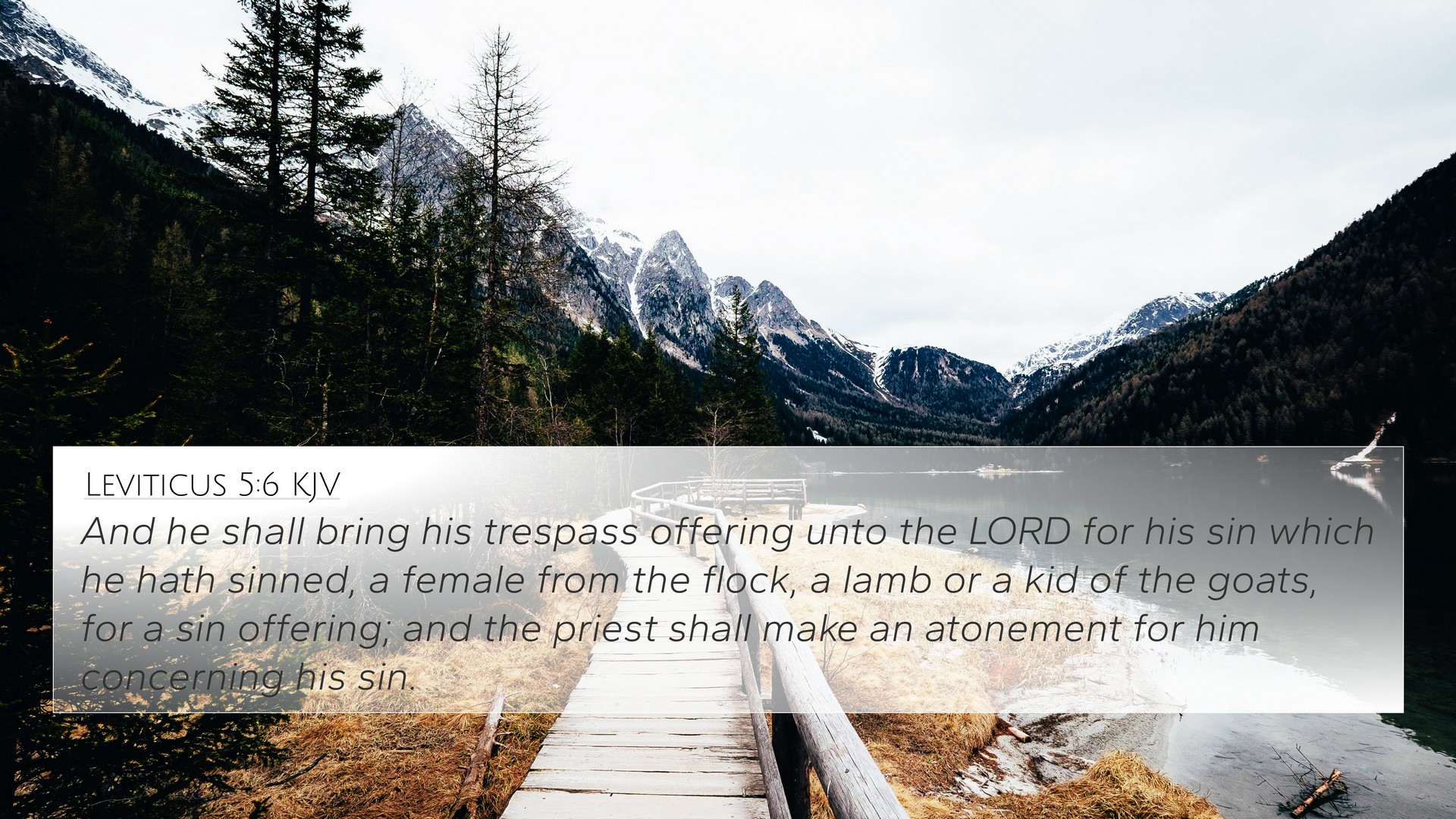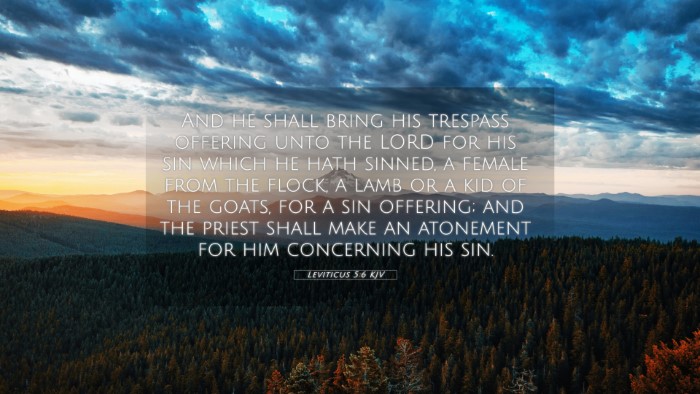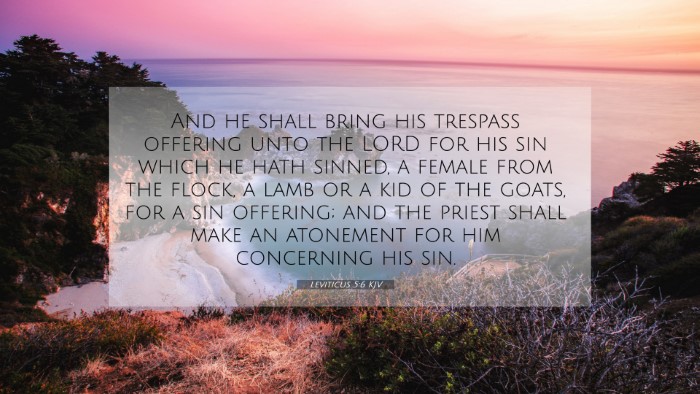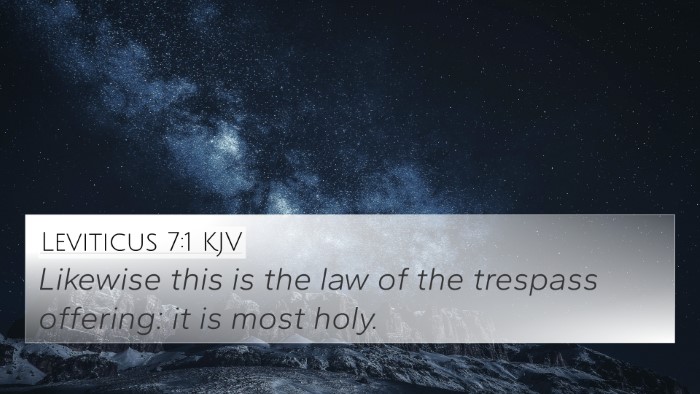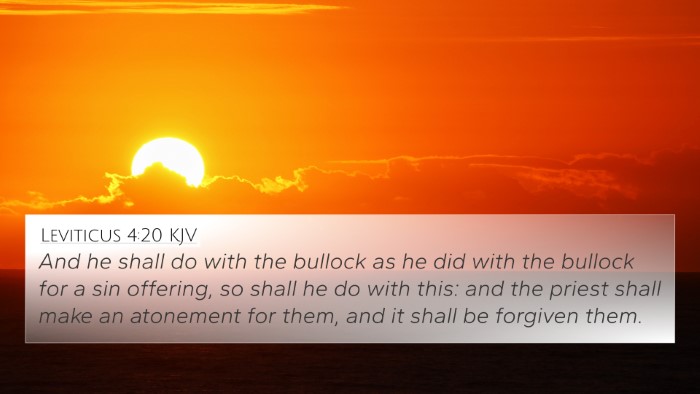Understanding Leviticus 5:6
Verse: "And he shall bring his trespass offering unto the LORD for his sin which he hath sinned: a female from the flock, a lamb or a kid of the goats, for a sin offering; and the priest shall make an atonement for him concerning his sin."
Summary of Meaning
Leviticus 5:6 outlines the requirements for making a trespass offering, emphasizing the necessity of atonement for sin. This verse reflects the seriousness of sin and the need for contrition and the act of sacrifice to restore one's relationship with God.
Commentary Insights
Matthew Henry's Commentary
Henry explains that this verse illustrates the principle that all sin requires a remedy through sacrifice. The offering must come from the flock, symbolizing the personal cost of sin and the need for a holy mediator. It denotes God’s merciful provision for sin, showing that the sinner must take responsibility and approach God with a humble heart.
Albert Barnes' Notes
Barnes emphasizes the importance of the offering being a female from the flock, indicating that both men and women are required to atone for sin equally before God. This act of bringing the offering symbolizes one's recognition of sin and the desire for reconciliation. Yet, it also shows God's grace in allowing a sinner to get right with Him through the sacrificial system.
Adam Clarke’s Commentary
Clarke points out that this verse is part of a larger legal context that outlines various offenses and their corresponding sacrifices. He notes that it underscores the necessity of acknowledging one's faults and making restitution. Clarke also mentions that it serves to foreshadow the ultimate sacrifice of Christ, linking the Old Testament sacrificial system to New Testament teachings on atonement.
Cross-References
- Exodus 30:10: "And Aaron shall make an atonement upon the horns of it once a year with the blood of the sin offering of atonements: once in the year shall he make atonement upon it throughout your generations: it is most holy unto the LORD."
- Leviticus 4:27-31: This section describes the trespass offering, emphasizing the seriousness of sin and the importance of atonement.
- Hebrews 9:22: "And almost all things are by the law purged with blood; and without shedding of blood is no remission."
- 1 John 1:9: "If we confess our sins, he is faithful and just to forgive us our sins, and to cleanse us from all unrighteousness."
- Isaiah 53:5: "But he was wounded for our transgressions, he was bruised for our iniquities: the chastisement of our peace was upon him; and with his stripes we are healed."
- Romans 3:25: "Whom God hath set forth to be a propitiation through faith in his blood, to declare his righteousness for the remission of sins that are past, through the forbearance of God."
- James 5:16: "Confess your faults one to another, and pray one for another, that ye may be healed. The effectual fervent prayer of a righteous man availeth much."
- Matthew 26:28: "For this is my blood of the new testament, which is shed for many for the remission of sins."
- Colossians 1:14: "In whom we have redemption through his blood, even the forgiveness of sins."
- Galatians 3:13: "Christ hath redeemed us from the curse of the law, being made a curse for us: for it is written, Cursed is every one that hangeth on a tree."
Thematic Connections
The verse in Leviticus connects to various themes in Scripture:
- Atonement: Explicitly focuses on the necessity of a sacrifice for the forgiveness of sins.
- Responsibility: Highlights the individual's duty to recognize and address their own sins.
- Grace: Demonstrates God’s provision for atonement, illustrating His love and mercy.
- Redemption: This verse foreshadows the ultimate redemption through Christ.
Applications and Interpretations
In interpreting Leviticus 5:6, believers are encouraged to:
- Recognize the weight of their sins and the need for atonement.
- Engage in sincere confession and repentance.
- Understand the importance of interceding for oneself and others.
- Appreciate the historical context of sacrificial laws and their fulfillment in Christ.
Conclusion
Leviticus 5:6 is not just an Old Testament legal requirement; it resonates throughout scripture as a vital link in understanding sacrifice, sin, and the pathway to reconciliation with God. Cross-referencing relevant scriptures enhances our grasp of these theological themes and deepens one’s faith through comparative Bible verse analysis.
